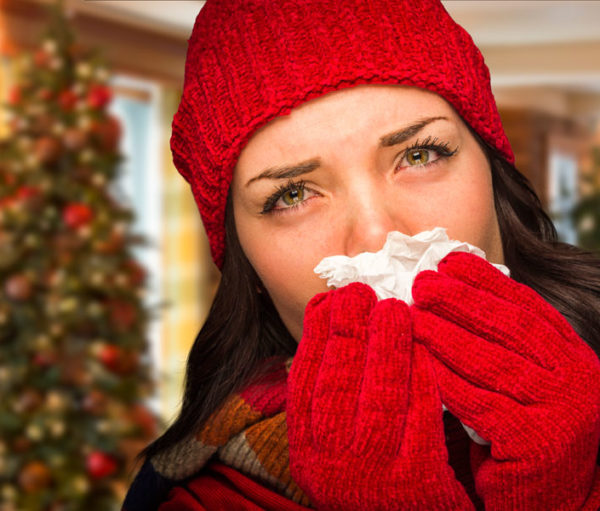Here Come the Holidays … And Allergies

We love our winter holidays. Our five senses delight in the ornament-laden Christmas trees, glowing Hanukkah menorahs, delicious spreads of traditional foods, and greenery everywhere that create a festive mood.
But though the sights and sounds of the season might bring joy, some of the smells and tastes can have quite the opposite effect for people with allergies! Dr. Rachna Shah of Loyola Stritch School of Medicine reports that these individuals should avoid the unwanted gift of an allergic reaction. Here are some pitfalls:
Heirloom décor. The holidays begin when we dig out those boxes of decorations that we tucked away out of sight last year. Heirloom ornaments, the Christmas tree skirt Grandma sewed years ago, Aunt Ruth’s Hanukkah linens, or that pinecone centerpiece the kids made in 1975 might make a welcome reappearance … welcome, that is, unless a family member is allergic to dust or mold spores. “The dust from the boxes and on the decorations that have been packed away in dank basements or dusty attics is triggering reactions in my allergy and asthma patients,” reports Dr. Shah, who also serves as an allergist at Gottlieb Memorial Hospital in Melrose Park, IL. She recommends storing decorations in large, resealable tubs. And don’t wait until next year to bring them out again; dust these treasures occasionally during the year.
Christmas trees and greenery. The wonderful fragrance of a freshly cut fir or spruce smells like the holidays—but causes respiratory problems for some allergy sufferers. Mold spores that hitch a ride on trees also create a problem. Shah recommends spraying down the tree before bringing it in the house, and not keeping it around too long. Be sure to change the water in the tree stand so it doesn’t harbor mold. Is an artificial tree a better choice? Dr. Shah says yes, but as with ornaments, be sure the tree is stored in a dry place and kept clean.
Artificial fragrances. For people who are sensitive to fragrances, the holidays are an olfactory minefield! Scented candles, holiday potpourri bowls, incense in religious ceremonies and ramped up scent dispensers in stores can make the season far from jolly. Says Dr. Shah, “The fragrance aggravates the sinuses and respiratory system so sufferers can’t breathe.” Have mercy on guests with allergies by avoiding the use of these products in your home or business.
Holiday flowers. This is the time when festive red poinsettias and other flowers appear in clusters everywhere. But these and other flowers can aggravate allergies, and the soil of live plants can harbor mold spores.
Be mindful of what’s on the buffet. Holiday parties feature yummy treats—but if you have food allergies, be careful. Ask the host to alert you to foods that contain ingredients you shouldn’t consume. Dr. Shah says, “Those with egg, nut or dairy allergies especially can play it safe and enjoy the parties if they know what they are eating and drinking. Communicating in advance with the host can help avoid illness.” Of course, if the party is a pot luck or catered, your host probably doesn’t have the information you need. Dr. Shah advises that it might be safest to bring your own treats, just in case.
And one last suggestion. The holidays can be a stressful time, and stress can aggravate allergic reactions and asthma. Dr. Shah says, “Use relaxation methods such as deep breathing, meditation or yoga to maintain control during the holiday hustle and bustle.” This is a great idea for every holiday reveler, allergic or not!
Source: IlluminAge reporting on news release from Loyola Medicine
The information in this article is not intended to replace the advice of your healthcare provider. Discuss allergies and potential triggers with your doctor.


